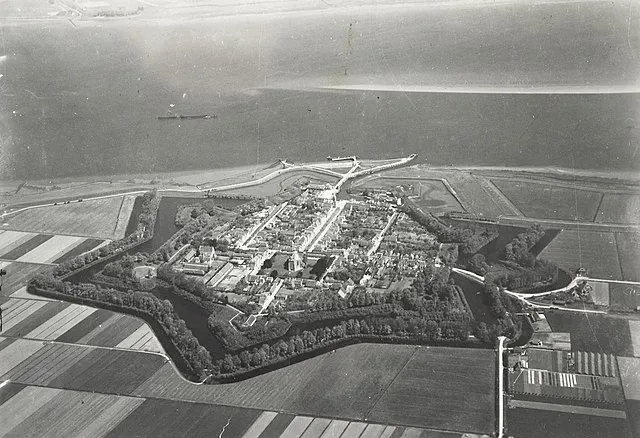A German commander's strategy during Liberation
Willemstad, a centuries-old fortified town, proved a tough nut to crack for the Allies in November 1944. A British divisional commander thought he could force the German occupiers to surrender by threatening them with heavy war violence. However, Willemstad's German commander outsmarted him.
West Brabant was liberated by a truly international force. General Crerar's First Canadian Army commanded Polish, American and British divisions in addition to Canadian divisions. The British 49th Infantry Division had liberated Roosendaal on 30 October 1944.
The Division's ultimate goal was the capture of Willemstad, the old fortified town on the Hollands Diep. This town, with its centuries-old defences, was militarily a tough nut to crack for the British forces. The fortress had been fortified by the German troops with modern bunkers. Moreover, the flat marshland made any approach basically impossible. A direct attack would claim many casualties among the British soldiers. To prevent this, Division commander, Major-General "Bubbles" Barker, devised a plan to capture Willemstad without bloodshed.
On 6 November 1944, Barker sent his assistant, Par…
West Brabant was liberated by a truly international force. General Crerar's First Canadian Army commanded Polish, American and British divisions in addition to Canadian divisions. The British 49th Infantry Division had liberated Roosendaal on 30 October 1944.
The Division's ultimate goal was the capture of Willemstad, the old fortified town on the Hollands Diep. This town, with its centuries-old defences, was militarily a tough nut to crack for the British forces. The fortress had been fortified by the German troops with modern bunkers. Moreover, the flat marshland made any approach basically impossible. A direct attack would claim many casualties among the British soldiers. To prevent this, Division commander, Major-General "Bubbles" Barker, devised a plan to capture Willemstad without bloodshed.
On 6 November 1944, Barker sent his assistant, Parson, to the fortified town to put pressure on the German commander, Colonel Walter Nass. In a letter, written in German, Barker threatened to shoot the entire town to smithereens. That this would lead to heavy losses among the German occupiers and the population was obvious. According to Barker, Nass's position was hopeless. He issued an ultimatum: he had to surrender by Monday 6 November at 18:00.
However, Nass was experienced and was not about to give in to the British forces' demand easily. He devised a strategy: he agreed to the departure of Willemstad's inhabitants, giving the British forces the allusion that he would fight for the town. While the British troops were busy taking in the civilians from Willemstad, Nass secretly ordered his troops to gather in the harbour. The next night, boats from the German navy picked up Nass and his men. When the British troops snuck into the fortress the next morning, after a massive artillery bombardment, it appeared that the bird had flown!
This is how to reach A German commander's strategy during Liberation
Starting point: from your location

